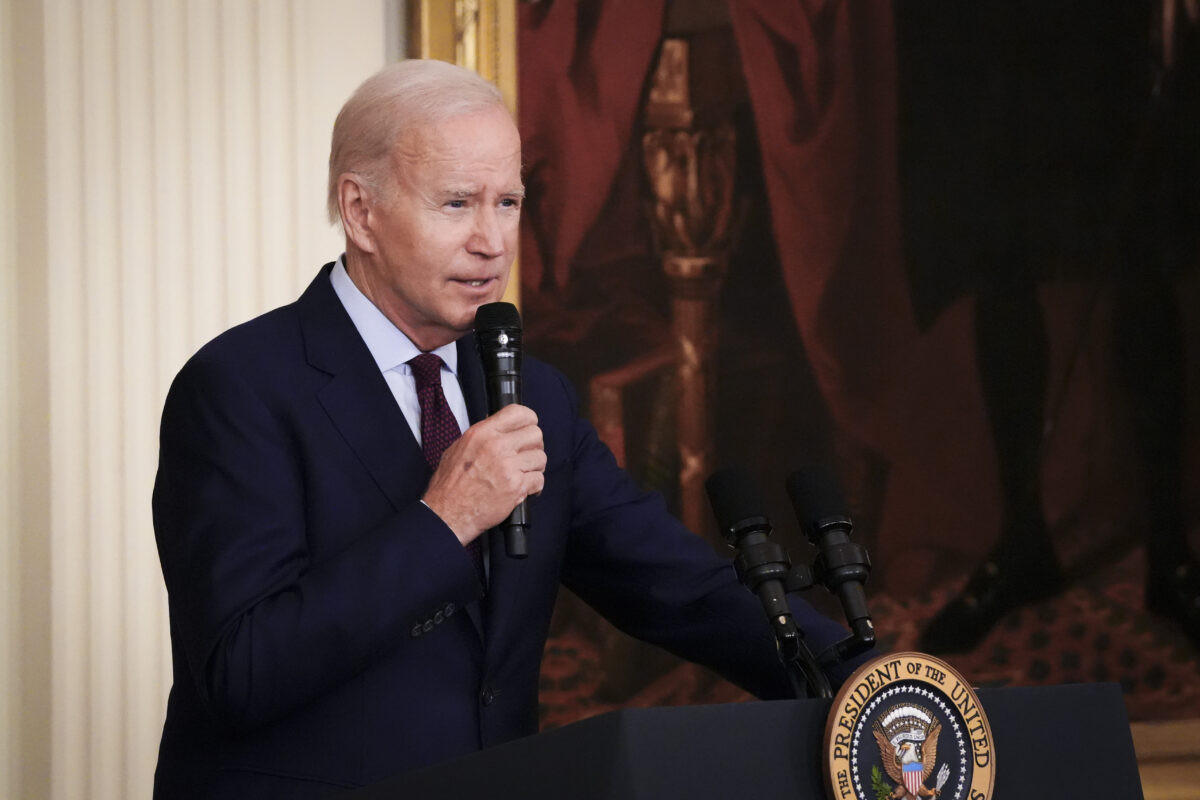

President Joe Biden has signaled that he might accept work requirement expansions as part of the compromise with Republicans to raise the debt ceiling, so long as they don’t affect health care programs.
“I’m not going to accept any work requirements that’s going to impact on medical health needs of people,” Biden told reporters on Wednesday at the White House before departing to Japan for the G7 summit. He also admitted that he did support some reforms that instituted work requirements for aid programs as a Delaware Senator in the 1990s.
“I’m not going to accept any work requirements that go much beyond what is already—I voted years ago for the work requirements that exist, but it’s possible there could be a few others, but not anything of any consequence,” he said.
Biden’s remarks come the day after a debt limit discussion he had with House Speaker Kevin McCarthy (R-Calif.) and other congressional leaders. The president on Wednesday called the meeting “productive” and “civil and respectful.”
“Everyone came to the meeting, I think, in good faith,” he said. “I’m confident that we’ll get the agreement on the budget and that America will not default, and every leader in the room understands the consequences if we fail to pay our bills.”
A Republican proposal, which is incorporated into a debt limit plan the House narrowly approved last month in a 217-215 vote, would establish new work requirements for recipients of Medicaid, the taxpayer-funded program aimed to help low-income Americans get health insurance coverage.
With the new requirements, able-bodied adults ages 19 to 55 who don’t have children or other dependents would have to work to remain eligible for Medicaid benefits. Specifically, they would have to complete at least 80 hours of work each month to stay on health care coverage. Job training and community service would count toward fulfilling the work requirement.
Some 15 million out of the 84 million Americans currently enrolled in Medicaid would be subject to the new requirement, according to an estimate by the Congressional Budget Office.
The office also estimates that Medicaid would save $120 billion over the next 10 years if recipients were required to work at least 20 hours every week, at the expense of 600,000 people getting kicked off Medicaid over the same period.
Republicans said their proposed policy is meant to push Americans into jobs that might eventually help them get out of reliance on the government for health care.
According to House Majority Leader Steve Scalise (R-La.), basic work requirements like this are not only consistent with common sense but are also fair to Americans who work and pay taxes.
“The voters of Wisconsin […] were asked this question: ‘Should people have to try to find work in order to get welfare benefits?’” Scalise said April 26 press conference, pointing to a Wisconsin welfare benefits referendum. “Did you know that 79.9 percent of Wisconsin voters […] said, ‘Absolutely Yes?’”
“When we say, ‘Let’s have some basic work requirements,’ we’re not talking about small numbers. It’s over hundreds of billions of dollars of savings that the taxpayers would get,” the congressman added. “That single mom that’s working two or three jobs right now to make ends meet under this tough economy, she doesn’t want to have to pay for somebody who’s sitting at home [not] working who is fully able-bodied.”
Democrats, however, have strongly opposed the proposal to apply work requirements to Medicaid precipitants, arguing that it would only cause more already vulnerable people to lose health insurance.
“The proposed cuts by House Republicans would devastate so many Americans who rely on Medicaid—children, seniors, people with disabilities,” Sen. Bob Casey (D-Pa.) said Monday in a floor speech.
“We must reject any bill that will increase poverty and take away health care from Americans.”
Biden is leaving Washington on Wednesday for Hiroshima, Japan, for a meeting with G7 leaders. He announced Tuesday that he will be skipping the pre-planned second half of his trip, which included a stop in Australia and Papua New Guinea. He will return to the United States on Sunday.
“I’m postponing the Australia portion of the trip and my stop in Papua New Guinea in order to be back for the final negotiations with congressional leaders,” Biden said at a Jewish American Heritage Month event at the White House.
“The nature of the presidency is addressing many of the critical matters all at once,” he added. “So I’m confident we’re going to continue to make progress toward avoiding the default and fulfilling America’s responsibility as a leader on the world stage.”
Some Republicans took issue with the president’s priorities, arguing that he should stay in Washington and focus on the debt ceiling crisis.
“I think he should not leave, and he should focus on the debt limit here at home,” said Sen. Rick Scott (R-Fla.).




Discount Applied Successfully!
Your savings have been added to the cart.